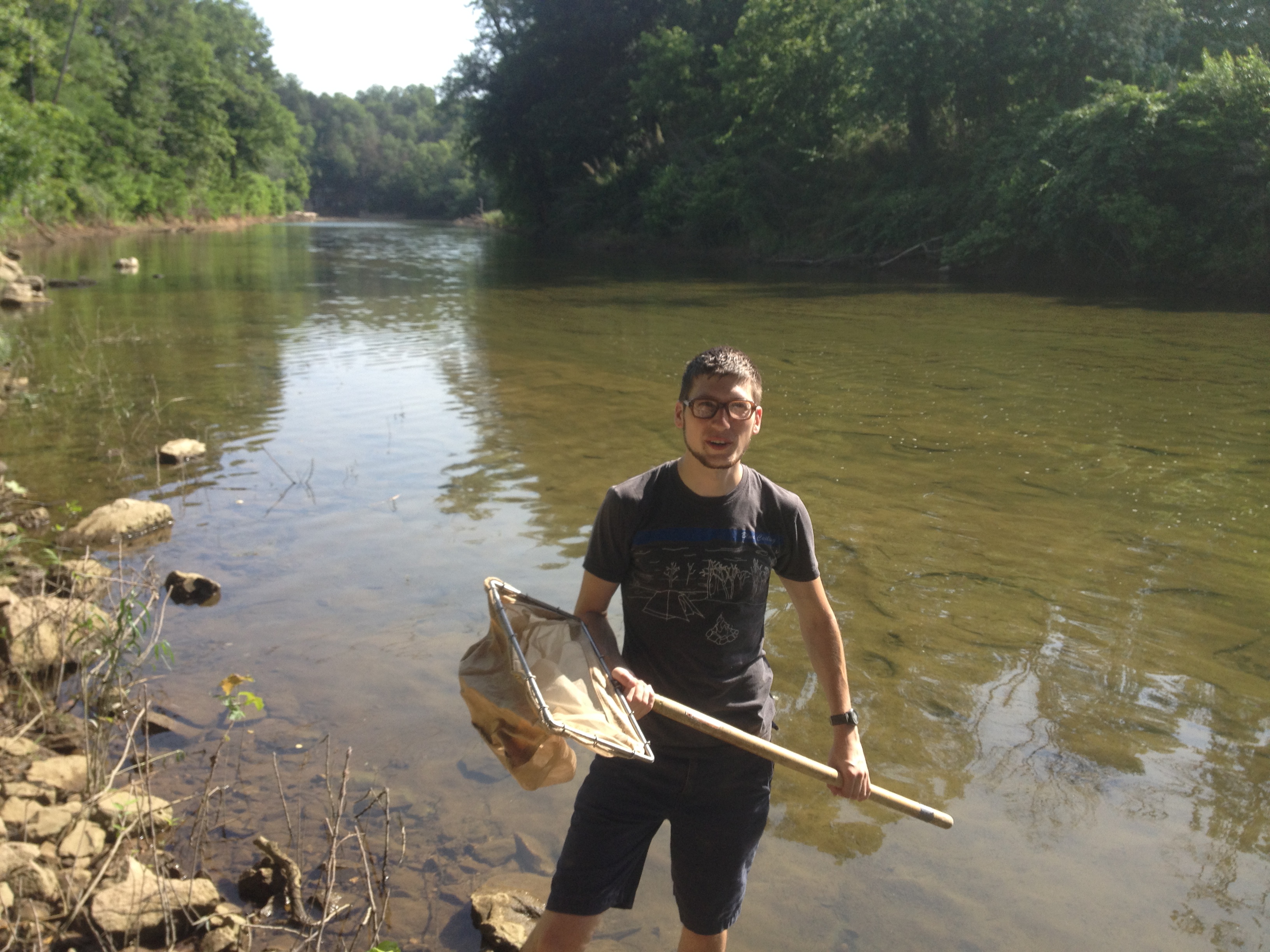Student Researcher Follows the Current in Costa Rica

Andrew Sanders, a student at the University of Arkansas, conducts field research in the White River. Courtesy of Hal Halvorson
FAYETTEVILLE, Ark. – Students make many choices during their undergraduate years. For University of Arkansas biology senior Andrew Sanders, many of his choices included field research, both locally and internationally.
Sanders conducted stream ecology research through most of his years at the university.
“I love ecology,” Sanders said. “Everything is connected. It’s like a spider web. If you disturb one part of the spider web you’ll see the vibrations elsewhere.”
Sanders became a technician in Michelle Evans-White’s stream ecology laboratory. Evans-White, an associate professor of biological sciences in the J. William Fulbright College of Arts and Sciences, and her graduate students study primarily the roles of aquatic animals in the transfer of organic matter and nutrients in freshwater environments.
Sanders conducted research at an Organization for Tropical Studies biological research station in Costa Rica in the summer of 2012 and fall of 2013. There, he studied crustaceans and insects known as “shredders.”
“Shredders are a really important functional feeding group in temperate streams that break down all of the leaf material that falls from the canopy,” he said. “Dead leaves are too big and too hard for most organisms to eat. Without shredders, leaves would stay and build up in the stream. There aren’t shredding insects in tropical streams, so I looked at whether crabs and shrimps took over that job, or maybe people were misidentifying insects.”
Sanders’ study did not determine what the tropical equivalents of shredders were. His time in Costa Rica brought him other experiences, including assisting in a bullet ant study.
“Andrew has had a phenomenal run at the university,” said Cynthia Sagers, professor of biological sciences at the University of Arkansas and chair of the Organization for Tropical Studies’ membership committee. “He is the non-honors student who found himself through a research experience. His passion for the study of ecology, discovered in temperate and tropical streams, will soon translate to an Ivy League Ph.D. program. This is what undergraduate research can do.”
Sanders, who is finishing his coursework this summer, said he will continue to study aquatic ecosystems next fall when he begins a doctoral program in ecology and evolutionary biology at Dartmouth College, working with Brad Taylor, an assistant professor of biological science. Sanders said he may study insect larvae phenotypes in streams that are abundant with predators and streams in which predators are scarce.
“This could really alter nutrient movement at an ecosystem scale,” Sanders said, “which is something humans are really interested in because of nutrient pollution. A lot of nutrients go into the Mississippi River, and cause a huge dead zone in the Gulf of Mexico, algal blooms and fish kills. A lot of streams are meant to be low nutrients, and now humans are messing with that.”
Contacts
Leah Markum, intern
University Relations
479-575-5555,
lmarkum@uark.edu
Chris Branam, research communications writer/editor
University Relations
479-575-4737,
cwbranam@uark.edu
Headlines
Honors College to Host Pulse Discussion Around Baltimore Bridge Accident
The Honors College will present a panel of faculty with expertise on engineering, labor history and supply chain to discuss the impact of the accident at 3:30 p.m. Wednesday, April 24, in Gearhart Hall, room 258.
Entrepreneurial Path Follows Tradition and Family Legacy
When Blanca Ruiz made a pivotal career decision to pursue a newfound passion rooted in a family legacy, she took advantage of training through the U of A Small Business Center.
'Peace' Sculpture by Native American Artist Dedicated at Adohi Hall
The 33-inch high bronze sculpture, created by Native American artist Retha Walden Gambaro in 1997, features a dove in two hands and titled simply "Peace," was donated by Richard Anderson and John Berry.
Cyber Careers with University SFS Alum Calvin Franz on April 25th
Alumnus Calvin Franz will be joining the CyberHogs RSO to talk about what it's like post-graduation as a cybersecurity developer in the public sector at 5 p.m. Thursday, April 25, at J.B. Hunt Center room 0216.
Take a Study Break in Mullins Library
As finals approach, the University Libraries have teamed up with partners across campus to offer study breaks in the east lobby of Mullins Library that are free and open to all U of A students.




